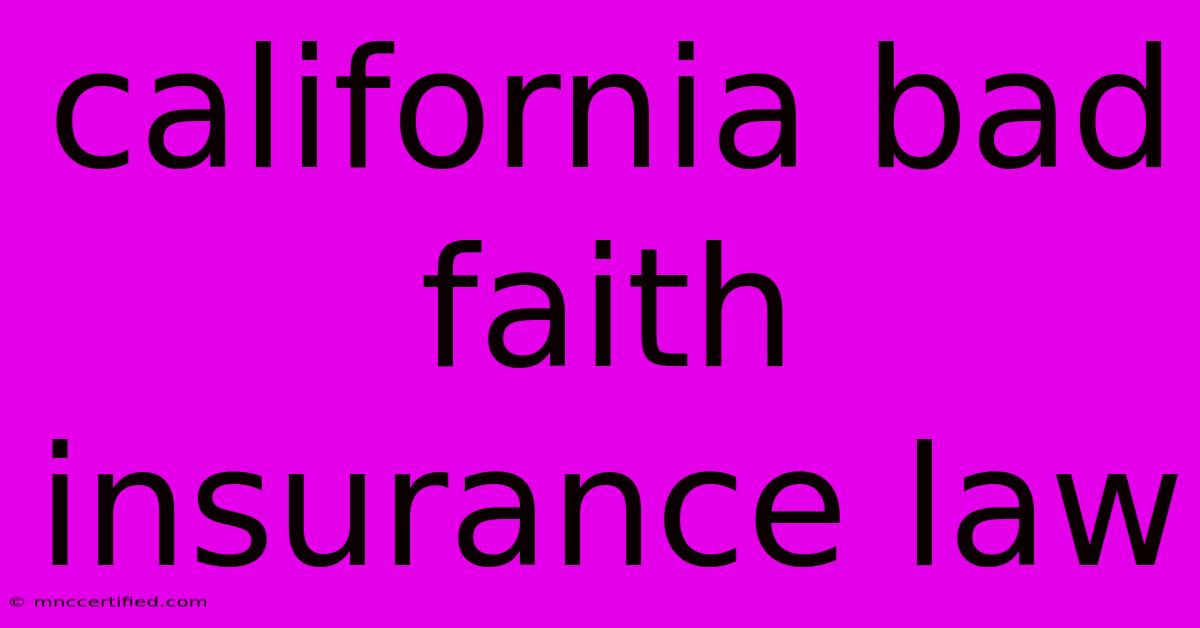California Bad Faith Insurance Law

Table of Contents
Navigating the Complexities of California Bad Faith Insurance Law
California is known for its strong consumer protections, and this is particularly evident in its insurance laws. California bad faith insurance law is a complex area, offering significant recourse for policyholders who believe their insurance company has acted unfairly or unreasonably in handling their claims. Understanding these laws is crucial for both policyholders and insurance companies alike. This article provides a comprehensive overview of California's bad faith insurance laws, focusing on key aspects and recent developments.
What Constitutes Bad Faith in California Insurance Law?
Bad faith, in the context of California insurance law, refers to an insurer's breach of the implied covenant of good faith and fair dealing. This covenant is inherent in every insurance contract and requires the insurer to act fairly and reasonably in handling its policyholders' claims. A breach occurs when an insurer:
- Unreasonably denies a claim: This includes denying a claim without a proper investigation, relying on insufficient evidence, or ignoring clear evidence supporting the claim. Examples include denying a legitimate claim due to a clerical error or failing to thoroughly investigate a claim before denial.
- Delays processing a claim unreasonably: Excessive delays in investigating or paying a legitimate claim, without justifiable cause, constitute bad faith. This can include failing to promptly acknowledge a claim, failing to request necessary information in a timely manner, or delaying payment without valid justification.
- Fails to properly investigate a claim: A thorough and reasonable investigation is critical. Failing to adequately investigate, such as failing to interview witnesses or obtain necessary medical records, can lead to a bad faith claim.
- Engages in unfair settlement practices: This involves engaging in tactics designed to pressure the insured into accepting a settlement far below the actual value of the claim. Examples include lowball offers, using aggressive tactics, or failing to negotiate in good faith.
- Breaches a specific policy provision: Violating a specific term or condition within the insurance policy could also be considered bad faith.
Proving Bad Faith in California: The Burden of Proof
To successfully claim bad faith, the policyholder must prove the insurer acted unreasonably and without proper cause. This requires demonstrating:
- The existence of a valid insurance policy: The policyholder needs to show they held a valid and enforceable insurance policy at the time of the claim.
- A breach of the implied covenant of good faith and fair dealing: The policyholder must demonstrate the insurer acted unreasonably or improperly in handling the claim, utilizing specific examples and evidence.
- Damages resulting from the insurer's bad faith conduct: This could include the amount of the claim itself, as well as additional damages such as emotional distress, attorney's fees, and punitive damages. Punitive damages are designed to punish the insurer for particularly egregious behavior.
Recent Developments and Trends in California Bad Faith Law
California bad faith law is constantly evolving through court decisions and legislative actions. Recent trends show a heightened focus on:
- Increased scrutiny of insurer claim handling practices: Courts are increasingly critical of insurers' reliance on procedural technicalities to avoid paying legitimate claims.
- Emphasis on transparency and clear communication: Insurers are expected to communicate clearly and transparently with policyholders throughout the claim process.
- Growing use of expert testimony: Expert witnesses are often used to establish the standard of care for claim handling practices and demonstrate the insurer's deviation from that standard.
Seeking Legal Counsel for Bad Faith Claims
Navigating California's bad faith insurance laws can be complex and challenging. If you believe your insurance company has acted in bad faith, seeking legal counsel from an experienced insurance bad faith attorney is highly recommended. An attorney can help you:
- Assess the merits of your claim: Determine whether you have a viable bad faith claim.
- Gather and organize evidence: Collect necessary documentation and evidence to support your claim.
- Negotiate with the insurance company: Attempt to reach a fair settlement without going to court.
- Represent you in court: If a settlement cannot be reached, your attorney will represent you in litigation.
This article offers a general overview of California bad faith insurance law. The specific details of each case will vary depending on the facts and circumstances. It's crucial to consult with a qualified attorney for advice tailored to your individual situation. Remember, acting promptly is essential when dealing with potential bad faith issues.

Thank you for visiting our website wich cover about California Bad Faith Insurance Law. We hope the information provided has been useful to you. Feel free to contact us if you have any questions or need further assistance. See you next time and dont miss to bookmark.
Featured Posts
-
Vending Machine Business Insurance
Nov 17, 2024
-
Insurance For Boat Rental Business
Nov 17, 2024
-
Confirmed Chelsea Women Vs Man City
Nov 17, 2024
-
Top British Film Featuring Hugh Grant
Nov 17, 2024
-
Lsu Vs Florida Live Stream
Nov 17, 2024